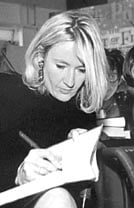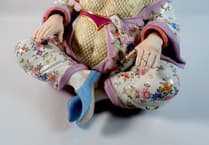J.K. Rowling lived at Tutshill during her formative years. Her parents Anne and Peter moved from north of Bristol to Church Cottage when Joanne was nine.
She attended the St Luke's primary school next door with her younger sister Di. A biography published in the week of the launch of the first Harry Potter movie, J.K. Rowling (Michael O'Mara Books, £16.99) by Sean Smith, suggests that Joanne later borrowed some of the characteristics of a husband and wife pair of Welsh teachers for characters in the Hogwarts Academy for wizards.
She then attended Wyedean School where her mother Anne became a lab technician. Tragically, Anne was suffering from MS (multiple sclerosis), which she died from a few years later at the age of 44.
Jo was bookish, reading voraciously, but also plugged in to current youthful trends.
"For young people the whole area is like a large open prison," Sean Smith suggests in his account of her teenage years.
"The nearest cinema is at Coleford, and it was here that Joanne went with her friends to see Grease, which became the favourite film of her year." Her friend Andrea Andrews recalls that, "There was a youth club in Woodcroft and occasional discos at the Drill Hall in Chepstow. They were the highlight of our lives."
Specialising in foreign languages, and becoming head girl in the 6th form, Jo was thought good enough to apply for a place at Oxford – but was rejected. She went to Exeter instead, where she carried on scribbling stories while enjoying an active social life.
She broadened her horizons during a language-learning year out, teaching English at a school in Paris. Having graduated, she decided to follow her boyfriend to Manchester.
It was on a train back from a weekend's flat-hunting there that, she says, "All of a sudden the idea for Harry just appeared in my mind's eye. I have never been so excited by an idea."
When her mother died in 1990, her father moved to Chepstow and remarried. Her love affair ended, Joanne took a job as a language teacher in Portugal.
She got married here, the marriage producing her daughter Jessica. When the relationship ended in tears, she retreated to Edinburgh where her sister – herself now married – was living.
She was carrying with her the first three chapters of her Harry Potter story. While living on social security, and with Jessica in a pram, she carried on writing in her brother-in-law's French-style cafe.
It was eventually accepted by the small but sophisticated publishers Bloomsbury, who offered her a £1,500 advance on royalties. Their option on future volumes in what was planned as a seven-part saga turned out to be the best deal in publishing history.
Joanne gained her Dip.Ed in 1996, and was awarded a writer's bursary later that year – very welcome at the time. Harry Potter and the Philosopher's Stone was published in June 1997.
It sold 70,000 copies in the first year, remarkable enough for a novice author. But an American publisher had snapped up the US rights, and this wider market was to become basis for her best-seller status – and the marketability of the stories as movies.
The reviews of the Harry Potter film this week have been not just ecstatic, but admiring. The qualities of the books – especially the wit – have been successfully transferred to the screen.
The biography answers one of the enigmas of the J K Rowling phenomenon. Her publishers told her she had to use initials for her name, because boys don't read books written by women. And the "K" is meaningless – it just sounded better.




.jpeg?width=209&height=140&crop=209:145,smart&quality=75)